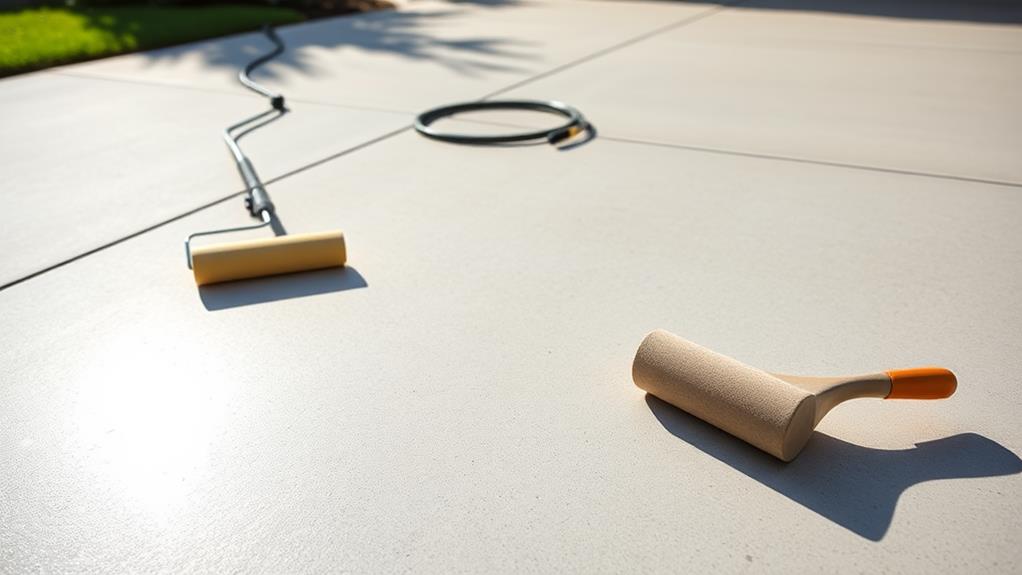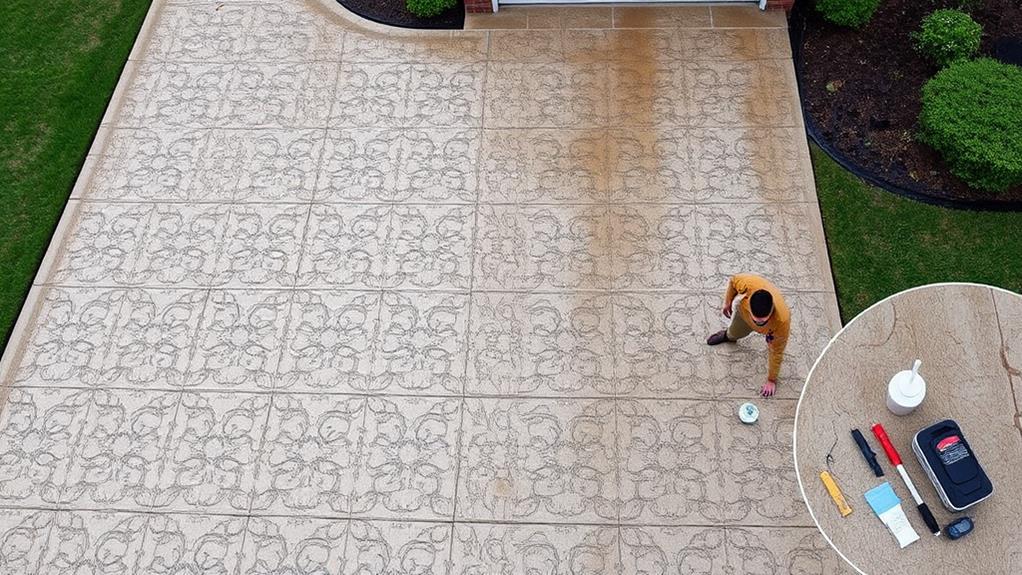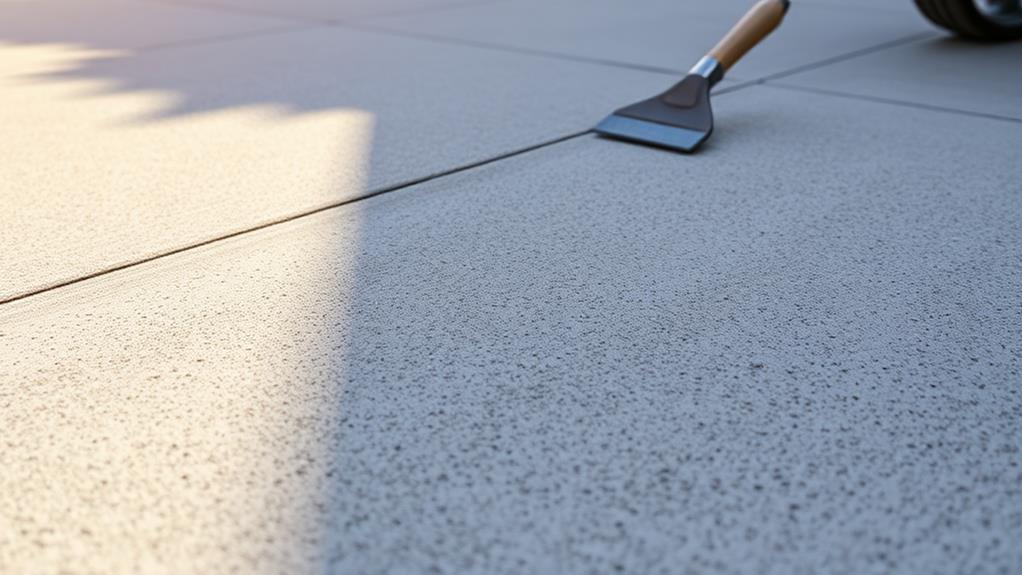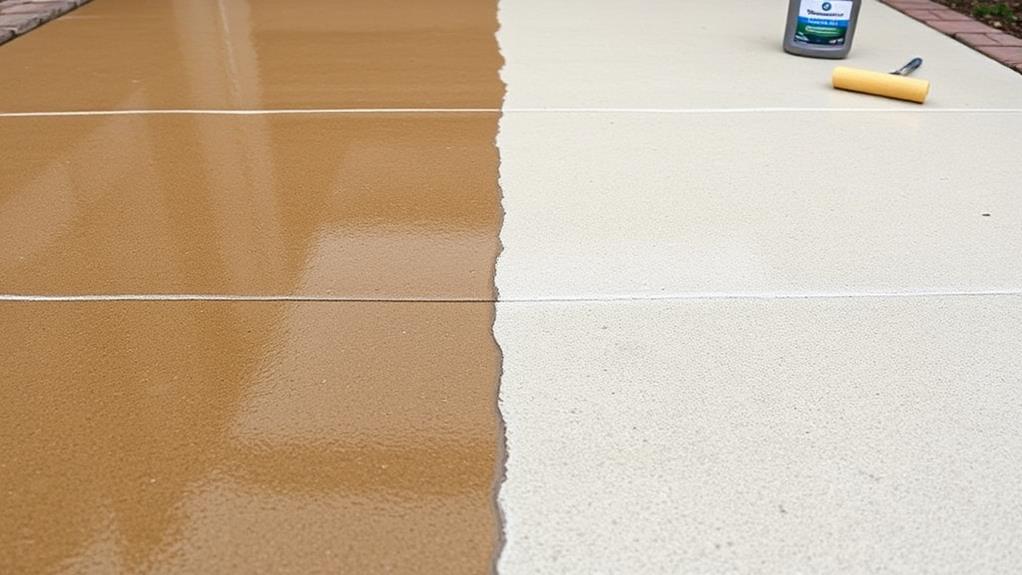Maintaining Your Concrete Driveway: Tips for Longevity and Durability

As a homeowner, you've invested in a concrete driveway that enhances your property's curb appeal and functionality. But have you considered the long-term care it requires? Your driveway faces constant exposure to the elements, vehicular traffic, and potential chemical spills. Without proper maintenance, it can deteriorate faster than you might expect. From choosing the right concrete mix to regular sealing and prompt repairs, there's more to driveway care than meets the eye. Let's explore the essential tips that'll help you protect your investment and keep your driveway looking pristine for years to come.
Concrete Contractor Highlights
- Regularly clean your driveway with pressure washing to remove stains, debris, and prevent deterioration.
- Apply a high-quality concrete sealer every 2-3 years to protect against moisture penetration and weathering.
- Promptly repair cracks and address spalling to prevent further damage and maintain structural integrity.
- Avoid using de-icing chemicals in winter, opting for sand or kitty litter for traction instead.
- Ensure proper drainage around your driveway to prevent water pooling and potential freeze-thaw damage.
Concrete Contractor Services Residential And Commercial

Our professional concrete contractor services cater to both residential and commercial clients, offering complete solutions for maintaining concrete driveways. With years of experience, we've earned a reputation for being leaders in the industry and a team of skilled technicians, we specialize in repairing cracks, sealing surfaces, and addressing common issues like spalling and discoloration.
Our services include pressure washing, resurfacing, and applying protective coatings to extend the life of your concrete driveway. We use high-quality materials and cutting-edge techniques to guarantee durability and aesthetic appeal. Whether you need routine maintenance or extensive repairs, our experts can assess your driveway's condition and provide tailored solutions to meet your specific needs, enhancing both the functionality and value of your property.
Proper Concrete Mix Design

When designing a proper concrete mix for your driveway, you'll need to carefully consider the strength and durability ratios to safeguard long-lasting performance. Opting for a robust and enduring construction approach can further enhance the driveway's resilience.
The water-cement ratio is imperative, as it directly impacts the concrete's final strength and workability during installation. You'll also want to pay close attention to aggregate selection, choosing materials that will contribute to the overall stability and appearance of your driveway while meeting local climate and usage requirements.
Strength and Durability Ratios
At the heart of a long-lasting concrete driveway lies the proper mix design, focusing on strength and durability ratios. You'll want to guarantee that your concrete mixture achieves the ideal balance between compressive strength and resistance to environmental factors.
The perfect strength ratio for residential driveways typically ranges from 3,000 to 4,000 psi (pounds per square inch), providing sufficient load-bearing capacity for vehicles while maintaining cost-effectiveness.
To enhance durability, you'll need to deliberate the water-to-cement ratio, which directly impacts the concrete's porosity and resistance to freeze-thaw cycles. A lower water-to-cement ratio, around 0.45 to 0.50, will result in denser concrete with improved durability.
Additionally, incorporating air-entraining admixtures at a rate of 5-7% can drastically boost your driveway's resistance to scaling and cracking caused by freeze-thaw cycles. By carefully adjusting these ratios, you'll create a concrete mix that not only meets strength requirements but also withstands the test of time, ensuring your driveway remains a robust and integral part of your property for years to come.
Water-Cement Ratio Importance
The water-cement ratio is likely the most vital factor in proper concrete mix design for driveways. As a homeowner, you'll want to confirm that your contractor understands the significance of this ratio, as it directly affects the strength, durability, and longevity of your concrete driveway. The ideal water-cement ratio strikes a balance between workability and strength, typically falling between 0.45 and 0.50 for residential driveways.
When the ratio is too high, meaning there's excessive water in the mix, your driveway's concrete will be more prone to cracking, shrinkage, and reduced compressive strength. Conversely, a ratio that's too low can lead to difficulties in placing and finishing the concrete, potentially resulting in a less smooth surface. It's essential to work with a professional who can accurately calculate and maintain the proper water-cement ratio throughout the mixing and pouring process. This attention to detail will confirm that your driveway not only looks great upon completion but also stands the test of time, resisting the wear and tear of daily use and environmental factors.
Aggregate Selection Considerations
Choosing the right aggregates plays an essential role in creating a durable and long-lasting concrete driveway. When selecting aggregates, you'll need to consider factors such as size, shape, and composition. Opt for a well-graded mix of coarse and fine aggregates to guarantee proper compaction and minimize voids in the concrete. Angular aggregates typically provide better interlocking, enhancing the overall strength of your driveway.
It's indispensable to select aggregates that are clean, free from impurities, and resistant to weathering. Ponder using crushed stone or gravel with a maximum size of 3/4 inch for optimal strength and workability. Incorporate sand as your fine aggregate, ensuring it's well-graded and free from excessive clay or organic matter. The proportion of coarse to fine aggregates should be carefully balanced to achieve the desired workability and strength.
You'll also want to ponder the aesthetic aspects of your driveway. Different aggregate types can influence the final appearance of the concrete surface. For example, river rock can create a smooth, rounded texture, while crushed limestone may result in a more angular, textured finish. By carefully selecting your aggregates, you'll guarantee a durable, attractive driveway that will serve you well for years to come.
Benefits

When you invest in a properly maintained concrete driveway, you're not just enhancing your home's curb appeal; you're also increasing its overall property value.
With its improved lifespan, a concrete driveway can last 30-40 years, making it a wise choice over other materials such as asphalt. The durable nature of well-maintained concrete makes it a long-lasting investment that can withstand years of use and various weather conditions.
Additionally, you'll find that concrete driveways typically require less upkeep compared to other materials, resulting in lower maintenance costs over time.
Increased Property Value
Homeowners who maintain their concrete driveways can enjoy a substantial boost in property value. When you invest time and effort into preserving your driveway's appearance and functionality, you're not just protecting your investment; you're enhancing your home's overall appeal. A well-maintained concrete driveway serves as a visual indicator of a property that's been cared for meticulously, which can be a decisive factor for potential buyers.
Your driveway is often the first thing visitors and passersby notice about your property. By keeping it in pristine condition, you're creating a positive first impression that can translate into tangible financial benefits. Real estate professionals consistently emphasize the importance of curb appeal in determining a home's market value. A driveway free of cracks, stains, and deterioration contributes extensively to this essential aspect.
Additionally, a properly maintained concrete driveway can last for decades, which is an attractive selling point for prospective buyers who value long-term durability and low maintenance costs. By preserving your driveway's integrity, you're not only increasing your property's immediate value but also ensuring its sustained marketability in the years to come.
Enhanced Curb Appeal
A well-maintained concrete driveway is a powerful asset in enhancing your home's curb appeal. As the first feature visitors encounter, your driveway sets the tone for your entire property. By investing time and effort into its upkeep, you're not only preserving its functionality but also creating a lasting impression that resonates with neighbors and potential buyers alike.
A pristine concrete driveway contributes extensively to your home's overall aesthetic, harmonizing with landscaping and architectural elements. Regular cleaning removes unsightly stains, algae, and debris, restoring the driveway's original luster and color. Sealing the surface every few years protects against weathering and wear, maintaining a smooth, uniform appearance that complements your home's exterior.
Furthermore, addressing cracks and imperfections promptly prevents deterioration and demonstrates your commitment to home maintenance. This attention to detail extends beyond the driveway itself, influencing perceptions of your entire property. A well-kept driveway suggests a meticulously cared-for home, potentially increasing its perceived value and attractiveness to prospective buyers. By prioritizing your concrete driveway's appearance, you're investing in your home's overall curb appeal and creating a welcoming entrance that you and your visitors will appreciate.
Long-Lasting Investment
Investing in proper maintenance for your concrete driveway yields long-term financial benefits that extend far beyond its aesthetic appeal. By consistently caring for your driveway, you're not only preserving its appearance but also significantly extending its lifespan. This proactive approach can help you avoid costly repairs or premature replacement, ultimately saving you substantial amounts of money over time.
Regular maintenance, such as sealing and prompt crack repair, acts as a protective shield against the elements, preventing moisture infiltration and subsequent damage. This protection is particularly vital in areas with harsh weather conditions, where freeze-thaw cycles can wreak havoc on untreated concrete.
Additionally, a well-maintained driveway enhances your property's overall value, potentially increasing its resale price and attracting prospective buyers should you decide to sell.
Furthermore, by investing in your driveway's upkeep, you're contributing to the collective aesthetics of your neighborhood, fostering a sense of community pride. This shared commitment to property maintenance can have a positive ripple effect, encouraging others to follow suit and ultimately benefiting the entire area's property values and desirability.
Low Maintenance Costs
While the long-term financial benefits of maintaining a concrete driveway are significant, it's equally important to ponder the immediate advantages of low maintenance costs. You'll find that concrete driveways require minimal upkeep compared to other materials, saving you both time and money. Regular sweeping and occasional power washing are typically sufficient to keep your driveway looking pristine.
Unlike asphalt or gravel, concrete doesn't need frequent resealing or replenishing. This translates to fewer out-of-pocket expenses and less time spent on maintenance tasks. You won't have to worry about annual treatments or specialized equipment for upkeep. Additionally, concrete's durability means you're less likely to encounter unexpected repair costs due to damage from normal use or weather conditions.
The low maintenance nature of concrete driveways also extends to weed control. Unlike gravel or interlocking pavers, concrete doesn't provide spaces for weeds to take root, eliminating the need for herbicides or manual removal. This not only saves you money but also contributes to a more environmentally friendly property. By choosing a concrete driveway, you're investing in a surface that offers both immediate and long-term cost benefits.
Sealing Concrete Against Moisture Penetration

Sealing your concrete driveway against moisture penetration is a vital step in maintaining its longevity and appearance. You'll need to carefully select the right sealer, master proper application techniques, and adhere to recommended resealing frequencies to ensure optimal protection. The following table outlines key considerations for each of these aspects, helping you make informed decisions about concrete driveway maintenance:
| Aspect | Considerations | Recommendations |
|---|---|---|
| Choosing the Right Sealer | Climate conditions | Acrylic for mild climates |
| Traffic volume | Epoxy for high-traffic areas | |
| Aesthetic preferences | Penetrating sealers for natural look | |
| Proper Application Techniques | Surface preparation | Clean and repair before application |
| Application method | Follow manufacturer's instructions | |
| Resealing Frequency | Environmental factors | Every 2-5 years, depending on exposure |
| Wear and tear | Inspect annually for signs of degradation | |
| Type of sealer used | Some sealers last longer than others |
Choosing the Right Sealer
A shield against moisture is essential for your concrete driveway's longevity. When selecting a sealer, you'll need to assess several factors to guarantee optimal protection. First, evaluate the type of concrete you have—whether it's stamped, colored, or plain—as this will influence your choice.
Penetrating sealers work well for most driveways, offering protection without altering the surface appearance. Film-forming sealers, on the other hand, provide a glossy finish and enhanced stain resistance.
You'll also want to evaluate the sealer's compatibility with your local climate. For areas with freeze-thaw cycles, choose a breathable sealer that allows moisture vapor to escape. In hot, sunny regions, opt for a UV-resistant formula to prevent premature degradation. Additionally, assess the sealer's durability and reapplication requirements. Some high-quality sealers may last up to five years, while others need annual reapplication.
Proper Application Techniques
Once you've chosen the right sealer, it's time to apply it correctly. Proper application techniques are paramount for ensuring your concrete driveway's longevity and protection against moisture penetration. Begin by thoroughly cleaning the surface, removing any debris, oil stains, or existing sealants. Allow the concrete to dry completely before proceeding.
Next, carefully read the manufacturer's instructions for your chosen sealer. You'll typically need to apply the product using a roller, sprayer, or brush, depending on the formulation. Start at one end of the driveway and work your way across in even, overlapping strokes. It's vital to maintain a wet edge to prevent lap marks and guarantee uniform coverage. Apply thin, even coats rather than one thick layer, as this promotes better adhesion and durability. Depending on the product, you may need to apply multiple coats, allowing sufficient drying time between applications. Be mindful of weather conditions, as temperature and humidity can affect the sealer's curing process. Once you've completed the application, allow the sealer to cure fully before subjecting the driveway to foot or vehicle traffic.
Resealing Frequency Recommendations
Concrete's durability doesn't eliminate the need for periodic resealing. As a conscientious homeowner, you'll want to protect your investment by adhering to recommended resealing schedules. Generally, you should reseal your concrete driveway every 2-5 years, depending on various factors such as climate, usage, and the quality of the previous sealant application.
In regions with harsh winters or frequent freeze-thaw cycles, you'll need to reseal more often, typically every 2-3 years. If you live in a milder climate, you might extend this interval to 4-5 years. However, it's essential to inspect your driveway annually for signs of wear, such as fading, flaking, or water absorption. These indicators suggest it's time for resealing, even if you haven't reached the typical resealing interval.
For ideal protection, consider using a high-quality, penetrating sealer that bonds with the concrete at a molecular level. This type of sealer offers superior resistance to moisture penetration and extends the time between applications. By diligently following these resealing recommendations, you're not just maintaining your driveway; you're preserving a necessary component of your home's curb appeal and value.
Concrete Contractor FAQ
How Long Does a Properly Maintained Concrete Driveway Typically Last?
You'll be thrilled to know that your well-maintained concrete driveway can last 30 to 40 years! With proper care, you're part of an exclusive group of homeowners who enjoy decades of durability from their investment. It's a smart choice!
Can I Park Heavy Vehicles on My Concrete Driveway Without Damaging It?
You can park heavy vehicles on your concrete driveway, but be cautious. It's best to spread the weight with plywood or reinforced sections. Regular maintenance and sealing will help protect your driveway and keep you in good standing with neighbors.
What's the Best Way to Remove Oil Stains From a Concrete Driveway?
You'll want to act fast on those pesky oil stains, friend! Start by absorbing excess oil with cat litter, then scrub with a detergent solution. For stubborn spots, try a commercial degreaser or poultice. You've got this!
How Often Should I Resurface My Concrete Driveway?
You'll typically need to resurface your concrete driveway every 20-30 years. However, if you're part of a neighborhood that values curb appeal, you might want to do it sooner. Regular maintenance can extend this timeline considerably.
Can I Install a Heated Driveway System in Existing Concrete?
You can install a heated driveway system in existing concrete, but it's challenging. It's best to do this during replacement or resurfacing. Consider electric heating mats or hydronic systems. You'll love the convenience and safety it brings!
